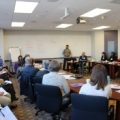
This post was written by Jess Meyer, a former member of our team.
If a desk could get lonely, mine would be feeling abandoned right now. I kicked off last week surrounded by energetic leaders from around the state at the spring meeting of the Colorado Network of Health Alliances, where we shared best practices, learned in technical assistance workshops, and developed shared action strategies. Then, I jumped on a flight to Calgary, where I am now, surrounded by Collect Impact leaders from around the world at the Champions for Change conference.
Talking about the countless dimensions of systems change with these colleagues—both new and old—is always an eye-opening experience. One of the biggest lessons I’ve walked away with this week is about perspective. A bird’s eye view—the kind that shows us the big picture, keeps our priorities straight, and identifies new opportunities—is critical when you’re working in collaborative strategies and the health system. However, a worm’s eye view—the kind that reminds you of your personal role and situation, lets you work through the details, and keeps you grounded—is important for leadership growth and development. Having spent a week thinking as both a bird and a worm, I picked up a few tips for gaining perspective on systems change work.
For a bird’s eye view, I learned two key acronyms that I plan to keep in my back pocket moving forward:
- Rip-Off and Duplicate (RND): There is no need to reinvent the wheel when working in systems change, according to Liz Weaver of the Tamarack Institute. Connecting with those who are doing similar work to share best practices and lessons learned is key.
- Good Enough, Push On (GEPO): Too often in the dynamic work of systems change, we try to achieve perfection. But in reality, it’s an unattainable goal. Setting realistic expectations, and continuing to push towards long-term goals, is key to successful systems change.
For a worm’s eye view, I learned two key concepts that will help me as an individual and leader involved in collaborative strategies for change:
- Remember my blind spots: John Kania of FSG challenged those of us leading backbone organizations to remember our blind spots as system leaders. Often we have assumptions we operate on that prevent us from truly changing the system. We must be open to others pointing out these blind spots, and helping us be aware of them.
- It is okay to not be well-rounded: In collaborative systems change efforts, there are a variety of different roles a leader can play, and individuals often naturally shine in only some of these roles. It does not make one an inadequate leader to not have all of those skills, and often work is better with multiple leaders with a diverse skill set. Our co-leaders make each another better at our work.
CCMU has long known that having different perspectives involved in the work makes for more successful systems change, so it was a great reminder that each individual can and should have multiple perspectives, too. We’ve also known that perspective is important to seeing the connections between our work and the work of local, state, national, and international initiatives, so I’m grateful for the opportunity to experience so much of that in one week. Now it’s time to get back to my desk and put these lessons to work!




